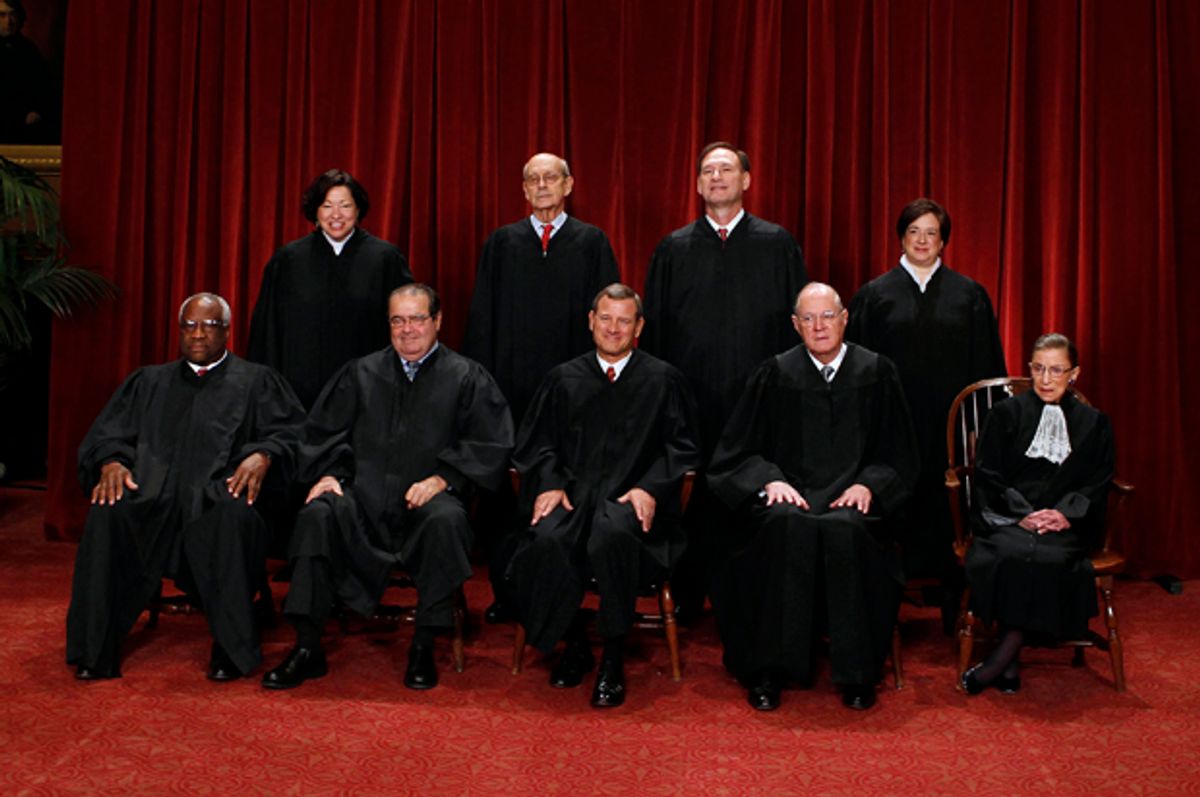Around the time that polls started closing in New Hampshire and Donald Trump and Bernie Sanders became the big political stories of the week, the Supreme Court issued a decision that raised the stakes of the presidential election and injected some uncertainty into one of the most significant developments in the global fight against climate change.
On Tuesday night, the court ruled 5-4 to halt the implementation of the Obama administration’s Clean Power Plan until the lower courts can hear challenges to the program’s legality. The Clean Power Plan was announced last August as a centerpiece of President Obama’s Climate Action Plan – it works by setting state-specific goals for reducing carbon emissions from existing power plants and granting states flexibility in devising their own plans for meeting those targets. Fossil-fuel power plants are the biggest emitters of greenhouse gases in the country, which means the Clean Power Plan is a critical tool for curbing carbon emissions. It also lends credibility to the U.S. as a participant in the Paris Climate Accord and as a global leader in the fight against climate change.
The Supreme Court’s decision throws all of that into question. The Clean Power Plan is now frozen in place as it maneuvers its way through the legal system to its inevitable date with the high court. “The court’s announcement doesn’t necessarily shut down the Clean Power Plan,” Wired notes. “But it could send a signal to recalcitrant states, manufacturers, and energy companies that they can keep dragging their feet on climate change.” The more immediate political impact is to make clear that the United States’ success in the fight against climate change, which is critical to the global campaign to reduce carbon emissions, will be determined both by the next president and the Supreme Court.
If the Clean Power Plan is in some way defeated and the U.S. can’t meet its obligations to reduce emissions under the Paris accord, then other countries will question why they should have to follow through on their commitments when one of the world’s largest polluters isn’t. At this point, it’s anyone’s guess how the high court will rule on the Clean Power Plan. As the New Republic’s Rebecca Leber notes, the Supreme Court hasn’t been “especially hostile toward the EPA” over the course of its history, but it’s concerning nonetheless that a majority of justices agreed to preemptively halt the Clean Power Plan. Guesswork about a potential ruling aside, it’s certain that the Clean Power Plan’s fate will be determined after the Obama administration has ended.
Ultimately, though, the country’s policy toward climate change will depend on who is elected to succeed Barack Obama as president. The election of a Republican to the White House will, at this point, guarantee that the U.S. will not be an effective participant in the fight against climate change, which in turn will render futile any international effort to curb emissions.
There are no Republican presidential candidates remaining who subscribe to the reality of climate change. Florida men Marco Rubio and Jeb Bush don’t put much stock in climate change even as their state is slowly, inexorably inundated by rising sea levels. Donald Trump thinks the concept of “global warming” was manufactured in China alongside his shirt and tie collection. Ted Cruz doesn’t believe climate science is accurate and dismisses its adherents as “alarmists.” John Kasich says climate change is “some theory that’s not proven.” Ben Carson thinks the pyramids were built to store grain, which isn’t really germane to the climate change discussion but I just wanted to throw it in there because he’s not going to be president anyway.
Among the Democrats, however, there’s shared agreement that climate change is real and that urgent action is required by the U.S. and the international community to stave off some of its worst effects. If the Obama climate agenda remains intact, they’ll enforce it as part of the U.S.’s commitment to the international community. If the Supreme Court strikes down the Clean Power Plan as too expansive, they’ll work on putting together a retooled regulatory package that can make it through the courts (while also nominating justices who tend to agree that the government has a role in fighting climate change).
The division is stark and the stakes are extraordinarily high. It’s not just our own climate policy that’s on the line this November – the fate of the international community’s most ambitious effort to tackle global warming yet could very well be determined by who wins the White House on Election Day.

Shares